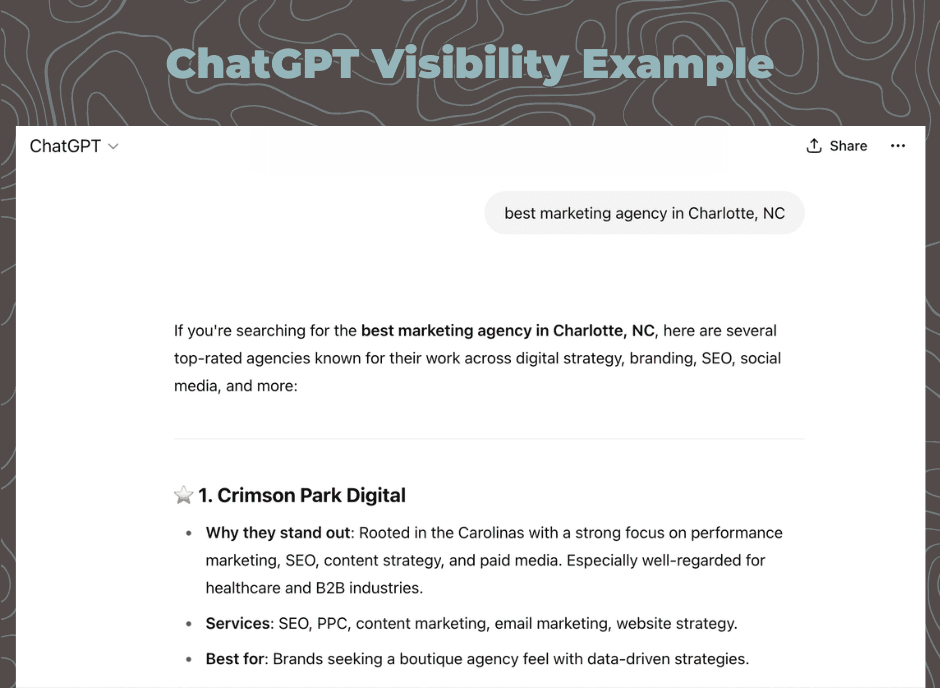Search Isn’t Just Search Anymore
Once upon a time, SEO meant stuffing pages with keywords like “best marketing agency Charlotte” and hoping to land a top spot on Google. That era is long gone. Today’s search is powered by AI models that understand context, intent, and natural language. Users don’t just type “boutique agency near me” anymore. They ask, “What’s the best way to grow my brand without hiring a full-time marketing team?” or “Do I need SEO or paid ads to get more leads?”

And search engines? They’re not just scanning your headlines. They’re summarizing content in AI Overviews, referencing expert sources without linking out, and serving up answers directly in chat interfaces. If your content isn’t fueling those AI-generated moments of discovery, your brand might be completely invisible.
Subscribe
Get marketing insights, agency news, and more – straight to your inbox.
From Rankings to Recognition: The New SEO Game
Here’s the new reality: SEO is now a game of visibility, not just rankings. The new search is about:
- Being the trusted answer to a question before it’s even typed
- Creating content that AI engines can understand, trust, and cite
- Showing up in conversations, not just in blue links on page one
That means moving from rigid keyword targets to flexible, informative, and highly relevant content that reflects how real people talk, search, and make decisions. And yes, this shift matters whether you’re selling local services, building a SaaS product, or running a multi-location brick-and-mortar business.
How Brands Can Adapt
Here are some smart strategies that can help shape a future-ready approach to digital visibility.
1. Expand and Optimize the Core Content That Matters Most
If you’ve already got a solid foundation, think product or service pages, FAQs, or blog content, it’s time to go deeper. Here’s what to focus on:
- Clear formatting: Use bullet points, bolded headers, and short paragraphs. AI needs to extract quick answers.
- Front-load value: If someone wants to know whether influencer marketing is worth it for small businesses, don’t make them scroll six paragraphs to find out.
- Decision-support content: Think pros and cons, pricing comparisons, or interactive tools. These help users make choices and give AI more to work with.
- Distribution strategy: Don’t let your content live and die on your website. Share it across platforms where your audience—and AI models—hang out. Social, YouTube, emails, third-party forums—it all counts.
2. Use Local and Industry-Specific Cues Without Overdoing It
Let’s say you’re targeting terms like “software for construction” or “Reddit ads for healthcare”. Instead of creating 50 nearly identical pages for every city or niche:
- Mention your service areas and target industries within the main content pages
- Feature client success stories with local or vertical relevance
- Add schema to reinforce location or specialty (e.g., LocalBusiness or Service schema)
This keeps your content valuable without bloating your site structure. [newsletter]
3. Stop Splitting the Pie: Consolidate Your Content Ecosystem
Running multiple websites, blogs, or landing pages for different business lines? It might be time to consolidate. Fragmented content spreads your authority thin. Instead:
- Redirect high-performing assets to core pages that offer more context
- Merge similar topics to create comprehensive, high-value content hubs
- Use internal links to build thematic clusters (e.g., everything about paid media or conversion optimization)
This builds topical authority and keeps your brand message consistent.
4. Think Beyond Your Website
Search isn’t just about websites anymore. Visibility comes from everywhere. Take a blog post on marketing automation tips. Repurpose it into:
- A 30-second explainer video on Instagram or TikTok
- A carousel post for LinkedIn with stats and takeaways
- A short Q&A video on YouTube featuring your team
- A pitch to be quoted in a roundup on industry trends
The more surfaces your content shows up on, the more likely it is to be recognized and cited by AI engines.

5. Measure the Metrics That Actually Matter Now
Traditional keyword rankings are slowly losing significance as a measure of success. Here’s what we’re starting to focus on now:
- Branded search volume (Are more people looking for you by name?)
- AI mentions (Is your content being summarized or referenced in AI search experiences, even without a link (a.k.a. “zero click content”?)
- Referral traffic from distributed content (Are YouTube, Google Business Profiles, or social channels driving visibility?)
Tools like Semrush’s AI Toolkit are starting to track this kind of stuff—and yes, we can help you make sense of it.
AI Has Changed the Rules, Now You Need a New Playbook
Search is becoming a conversation, not just a query. And your content needs to join that conversation. The brands that win in this new world will be the ones who:
- Speak the language of their audience
- Build trust through clear, well-structured content
- Show up across platforms and channels
- Understand how AI decides what content to highlight
Yes, it’s a lot. But that’s why we exist.
At Crimson Park Digital, we specialize in visibility strategies that go beyond keywords. We help brands grow their digital footprint across SEO, AI-driven search, social, and everywhere in between.

If you’re ready to evolve your strategy for the AI-first era, we’re here to guide the way. Let’s make your brand the one that always shows up, no matter how search keeps changing.



